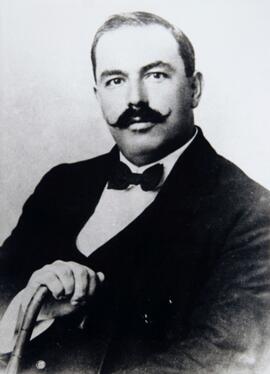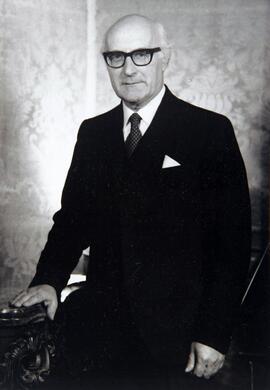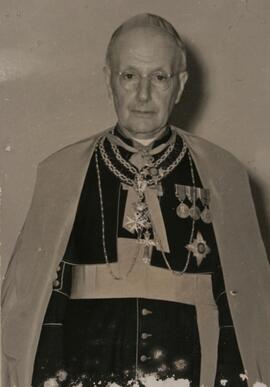Sir Alexander Wood was the son of the late Alexander Wood, (c.1750s–1807) esq an eminent member of the medical profession in Edinburgh. Sir Alexander Wood went to Ceylon on the civil establishment in 1801 and after filling the offices of member of the Council and sole Commissioner of Revenue, he returned to England in 1811. On Sir Thomas Maitland’s insistence, Wood, who had served under Maitland in Ceylon, was appointed Chief Secretary to the Government of Malta between 1815 and 1817. He was also Chief Secretary to the Government of the Ionian Islands, and up to the period of his demise was Resident Agent in England for the Ionian Islands. He was nominated a Knight Commander of St Michael and St George in 1820, and in the same year dubbed a Knight Bachelor. Sir Alexander Wood married the eldest daughter of Sir William Forbes of Pitsligo Bart, Christian Forbes, in 1807 and died on the 18th of March in 1847 at Holles Street Cavendish square.
Rodgers joined the RAF in his late20s and was a trained photographer, very often doing aerial photography. He also documented his time in Malta in the late 1930s through photography.
Matteo Pérez d'Aleccio (1547–1628), Italian painter, specialized in historical, nautical, and spiritual topics during the Mannerist era. He resided in Peru for more than 40 years, from 1588 to 1628, and spent most of that time creating art.
Mons Fortunat Mizzi was a Maltese priest and the founder of the Moviment Azzjoni Socjali. He was the only child of Prime Minister Enrico Mizzi and Bice Mizzi. Mizzi was ordered a priest in 1952 and founded the Moviment Azzjoni Socjali in 1955 amongst other trade unions and cooperatives. He was a member for many years in the Church’s councils and helped in the translation of the Vatican II Council documents. In 2010, together with Prime Minister Lawrence Gonzi, Mizzi set up the Fortunato and Enrico Mizzi Foundation to administer property, archives and other memorabilia of the Mizzi Family.
Dr Enrico Mizzi was a Maltese politician, leader of the Nationalist Party from 1926 and a Prime Minister of Malta in 1950. He was born in 1885 in Valletta to Maria Sofia Folliera de Luna, the daughter of the vice-consul of Naples, and Fortunato Mizzi. Mizzi studied in Gozo Seminary, read law at the University of Rome La Sapienza and the University of Urbino, and studied literature and science at the Royal University of Malta. He married Bice Vassallo and they had one son, Dun Fortunat Mizzi.
Mizzi was first elected to the Council of Government from Gozo in 1915 as Member of the Comitato Patriottico. He was arrested at his residence on 7 May and court-martialled on charges of sedition in 1917 under the Malta Defense Regulations for writings and statements against the British. He was sentenced to a year’s imprisonment with hard labour, the loss of civil rights, and the withdrawal of the lawyer’s warrant. The sentence was commuted by Governor Methuen to a ‘severe censure’, while his civil rights and warrant were restored following the cessation of hostilities in 1918.
Mizzi founded the Circolo Giovane Malta and was life president of the Societa Dante Alighieri. He was part of the Maltese Political Union coalition, whom he split and formed the Democratic Nationalist Party / Partito Democratico Nazionalista (PDM) to contest the elections for Malta’s first self Government. Later the PDN merged with the Maltese Political Union / Unione Politica Maltese (UPM) to form the Partit Nazzjonalista (PN). He was co-leader of the PN with Sir Ugo P. Mifsud (1926-1942).
On 30 May 1940, he was arrested and deported to Uganda, with another 47 Maltese people, where he remained in close contact with other members of the Partit Nazzjonalista. In 1945, the exiled persons, including Mizzi, were allowed back to Malta, where he re-entered politics and reorganised the PN. At the 1950 elections, Mizzi was appointed Prime Minister but he died three months later on the 20th December.
Bice Mizzi nee Vassallo was a Maltese pianist, considered among the foremost pianists of her generation. She is the daughter of composer Paolino Vassallo and Maria Anna nee Grech, and the wife of former Maltese Prime Minister Enrico Mizzi. Her first notable performance was in 1909 where she performed a recital at the Manoel Theatre under the patronage of the Bishop of Malta Pietro Pace, organised in aid of the Sisters of St. Joseph, Sliema. She also performed a recital at Wigmore Hall in London and performed at a concert by Maltese composer Carmelo Pace in 1946. Mizzi had a son, Dun Fortunat Mizzi. She died in 1985.
Anthony J. Mamo was born in Birkirkara on 8 January 1909 from Joseph Mamo and Carla Brincat. Educated at the Archibishop’s Seminary and later at the Royal University of Malta where, in 1931, he graduated as Bachelor of Arts (B.A) and in 1934, as Doctor of Laws (LL.D). As the first student in the course he was awarded the Government "Travelling Scholarship" and the "Bugeja Scholarship". He had short courses at London University and University of Perugia.
In October 1936 he was appointed member of the Commission which, under the chairmanship of Judge Harding, was entrusted with the task of preparing a Revised Edition of all the Laws of Malta.
During the Second World War he gave his services for refugee work and general service.
In 1942 Dr Mamo entered the Attorney-General's Office as one of the Crown Counsel. Here he occupied in succession all the grades (1950-52 – Senior Crow Counsel), until he himself became Attorney-General in 1955.
In the same period, from 1943 to 1957 he became Professor of Criminal Law at the University of Malta where for many here he was member of the Senate and President of the University Council.
Anthony Mamo served as chief legal adviser under 4 Prime Ministers: Sir Paul Boffa, Dr Enrico Mizzi, Dr Gorg Borg Olivier, Dominic Mintoff. and he accompanied all Ministerial delegations for discussions and negotiations with the British Government.
From 1957 to 1971 he was appointed as Chief Justice and president of the Court Appeal.
Towards the end of June 1962, Acting Governor pending the arrival of the new British governor, Sir Maurice Dorman.
In 1964 he was the First President of the Constitutional Court and in 1967 the First President of the Court of Criminal Appeals.
From 1971 to 1974, he was appointed as the first Maltese Governor-General.
When Malta was proclaimed a Republic in 1974, he was elected by the Parliament as the first President of Malta (13th December1974 - 26th December 1976).
Honors:
1955 – Officer of the Order of the British Empire (Commonwealth Honors).
1957 – Honorary Queen’s Counsel (Commonwealth Honors).
1960 - Knight Bachelor
1962 – Knight of Grace of the Venerable Order of St John.
06 April 1990 – Companion of Honor of the National Order of Merit by right as a former President of Malta.
Ian Colin Lochhead, author of 'Siege of Malta, 1565'.
Francis Laing was born at Edinburgh on 1 May 1773, son of Alexander, an architect. Laing studied at the University of Edinburgh 1789-90 and 1792-93, and the University of Glasgow in 1794, taking a Physics class under John Anderson. He was Snell Exhibitioner in 1796, and went on to graduate BA from Oxford in 1799 and MA in 1801. He took Holy Orders, becoming Reverend Francis Laing. In 1803 Laing served as Private Secretary to the Governor of Malta, and was shortly afterwards appointed Secretary to the Government of the Island, a post which he held till 1814. Returning to the UK, Laing was Rector of Llanmaes, Glamorgan from 1814 to 1824, and Rector of Humshaugh, Northumberland, from 1820 to 1832. He died at the Mythe, Tewkesbury, on 24 November 1861.
Mons Michael Gonzi was the Archbishop of Malta from 1944 until 1976. He has also been Bishop of Gozo and an elected Labour Senator in the Malta Legislative Assembly. Gonzi is known for his intervention in politics, having also interdicted the Labour Party, demanding people not to vote for them. He was born in Vittoriosa to Giuseppe Gonzi and Margherita Tonna. He was ordained to the priesthood in 1908, elected as a Labour Senator in 1921 and chosen as the Bishop of Gozo in 1924. Gonzi was created a Knight Commander of the Order of the British Empire in 1946, knighted for his services during the Second World War. In 1949, Pope Pius XII made him Assistant at the Pontifical Throne and created him a Papal Count. In the same year, Gonzi was awarded an honorary LLD degree by the University of Malta and was appointed Bailiff Grand Cross of the Sovereign Miliary Order of Malta. In 1963, Gonzi became member of the Order of the Cross of St Raimond de Penafort and in 1965, Commander of the Order of the Holy Sepulchre.
Michael Gonzi was born on May 13, 1885, to Ġużeppi Gonzi, a Dockyard foreman, and his wife Margerita Tonna, and baptised at Vittoriosa parish church. The Gonzi family moved to Kalkara when Michael was five. He died on January 22, 1984, and was buried in Mdina Cathedral, after a funeral Mass at St John’s.
Byatt was born on the 22nd of March, 1875, in Tottenham, Middlesex to schoolmaster Horace Byatt M.A., of Midhurst, Sussex, and Laura (née Archer). He attended school at Midhurst Grammar School, in Sussex. He was then admitted into Lincoln College, Oxford, where he obtained a Bachelor of Arts degree in 1898. Following this, he worked within the Colonial Service. His service began in Nyasaland (what is now Malawi), where he stayed until 1905, then went to British Somaliland. He was appointed commissioner and commander-in-chief of British Somaliland in 1911, serving until 1914, when he became Colonial Secretary in Gibraltar. From 1914 to 1916 he was lieutenant-governor and Colonial Secretary of Malta. In 1916 he became an administrator in British East Africa, later becoming the first governor of the new British mandate of Tanganyika in 1920. He was appointed Governor and Commander-in-Chief of the League of Nations Mandated Territory of Tanganyika from 1920 to 1924. In 1924 he married Olga Margaret Campbell of Argyll, and had three sons with her: Sir Hugh Campbell Byatt (1927–2011), Ronald (Robin) Archer Campbell Byatt (1930–2019), and David Byatt (born 1932). He died on the 8th of April, 1933, in London, aged 58.


